The first session of the Tokyo Conference 2024 Public Forum brought together representatives from think tanks in ten countries, and they engaged in an hour and a half of vigorous discussion about how to end the wars in Gaza and Ukraine and build peace.
As moderator, Genron NPO President Yasushi Kudo opened the session by reviewing the current state of the world, referring to the roughly fifty conflicts currently underway. He then laid the basis for the coming discussion by directly addressing the war in Ukraine and the war in the Gaza Strip between Israel and Hamas, the Islamic organization governing the autonomous Palestinian territory.
"What needs to be done to build a framework that will move us closer to achieving ceasefires in these regions?" Kudo asked the panel.
What sort of framework is needed to achieve ceasefires in Ukraine and Gaza?
Sunjoy Joshi, Chairman and Chief Executive of India's Observer Research Foundation (ORF), believes that the divisiveness of the responses to the two conflicts arises from connectivity, trade, energy, and other elements being weaponized in ways they never have before, and that this has led to greater polarization both in countries and between them, and between different regions of the world.
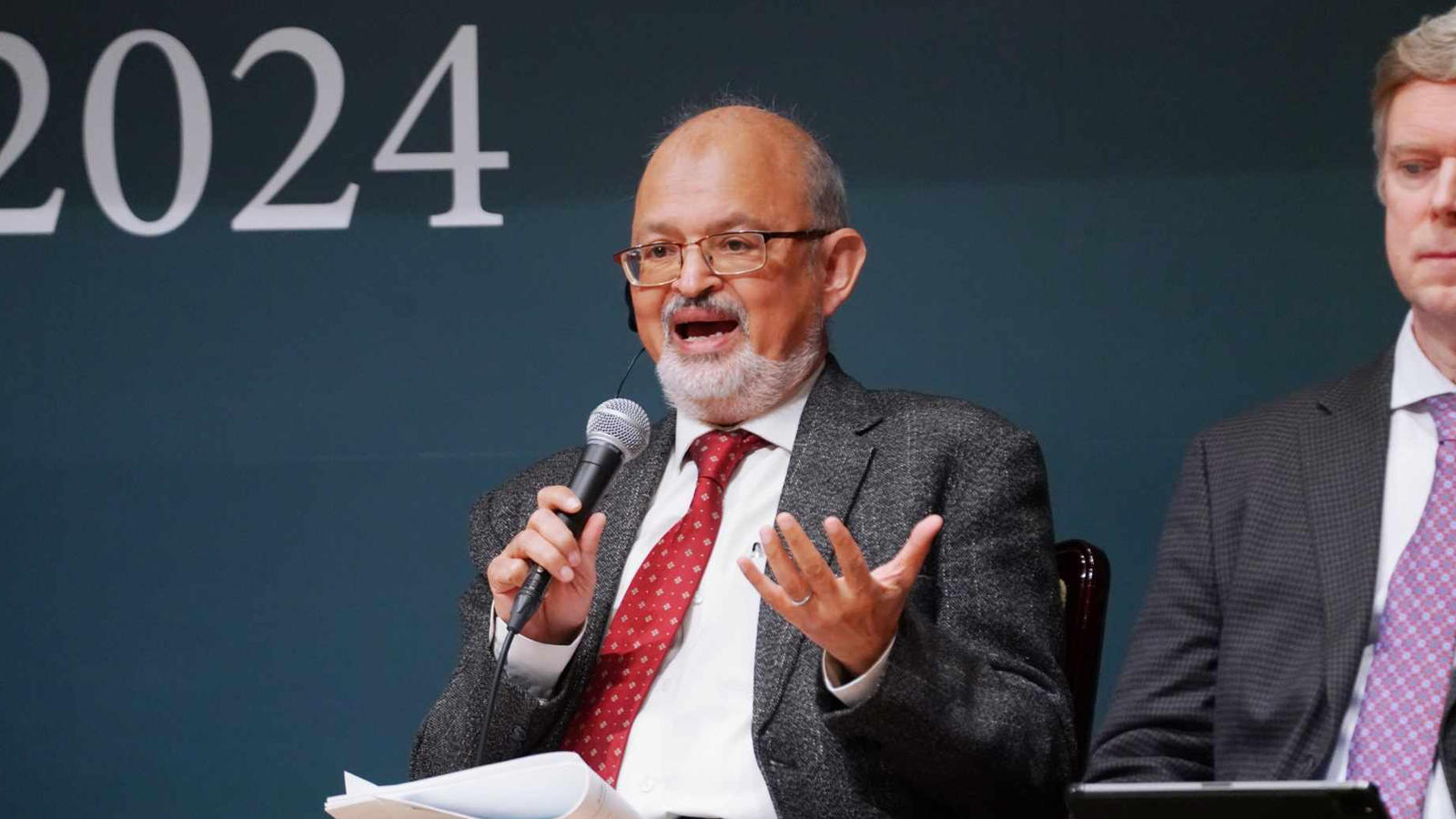
"The kind of stories we tell our children ten years from now are going to be different in the East and the West. Very different in the North and the South. This is the kind of polarization which cannot exist. This is why these conflicts disturb the mind so much," he said. We live in a multipolar world, but we're seeing it through extremely bipolar lenses. But all of us are imperfect...so let's forget these bipolar, black-and-white divisions between East and West, North and South. Let us have the courage to admit our mistakes."
Joshi explained that he feels that the answers can be found by thinking about "how we will change the narratives of how we perceive these wars and how we will get back to the table and discuss solutions."
Next to speak was Fabrice Pothier, former Director of Policy Planning with the office of the NATO Secretary General. He spoke first about the obstacles to finding a solution to ending the war in Ukraine.
"I think the problem is that we are not entirely clear on what are the terms favorable to both Ukraine and the broader West, and we are even less clear about whether we are willing to resources those 'terms'," he said. He emphasized that Ukrainian sovereignty and a return to the borders established in 1991 are "absolute terms" to Ukrainian President Zelenskyy and his government, but warned that, "international relations and war are not always about reaching absolute objectives, with few exceptions in history."
"I think you have to shrink the war," Pothier proposed. "You have to deny Putin certain escalatory options he has been using at will for two years."
He pointed out that there has already been some success in improving air defense and in limiting the operations of the Russian Black Sea fleet, and suggested that the Ukrainian air defense system is now potentially capable of reducing the Russian missile threat to major population and production centers, and to infrastructure. He also believes that Ukraine's allies need to make the "ultimate political commitment" of offering NATO membership as that would be equivalent to "signaling to Vladimir Putin that it is game over."
James M. Lindsay is Senior Vice President of the Council on Foreign Relations (CFR) in the USA, and he built upon the words of the previous two speakers when he said, "The challenge here is not merely to get a ceasefire, but to achieve a peace that is based on equitable terms ? that is just, that is stable, that is sustainable."
He noted that many of the countries of the Global South have hesitated in condemning the violations of national sovereignty experienced by both Ukraine and Israel, perhaps because the "the West is not living up to the principles that it preaches." He also spoke about Russia's intentions in Ukraine and the possibility of a ceasefire there.
"Now that the fighting of the war has turned at least slightly in Russia's favor, (Putin) is even less interested in negotiating an end to the war. President Putin has indicated that he believes if he waits long enough, he will get victory. That the West will eventually tire and cease its support of Ukraine."
Similarly, he touched upon the complexities of the conflict in Gaza, and upon the potential for increased tensions between the US and Israel arising from future Israeli offensives.
Stefan Mair is Director of the German Institute for International and Security Affairs and Executive Chairman of the Stiftung Wissenschaft und Politik (SWP). Mair expressed his agreement with Pothier's comments, and added that the current military situation in Ukraine makes reaching a quick ceasefire is less desirable for Russia.
"For Putin, his strategy has paid off...this will only encourage him to do this again," he said, pointing out that Putin has already threatened other countries in Europe. "I think a ceasefire is only possible on the basis of a different military balance, which has a precondition that Putin gets convinced that he can't win this war...and that he has more to lose by continuing the war than to gain."
He also disagreed that the current war is one of narratives, emphasizing that "It's about facts. A sovereign state invaded another sovereign state and occupied a third of its territory. It's hard to imagine which country would accept this and try to negotiate a ceasefire based on this."
Thomas Gomart, who serves as Director of the French Institute of International Relations (IFRI), clarified that he sees major differences between the conflicts in Ukraine and Gaza, and feels that drawing similarities between them is inappropriate. He also provided a broader perspective of the current global situation.
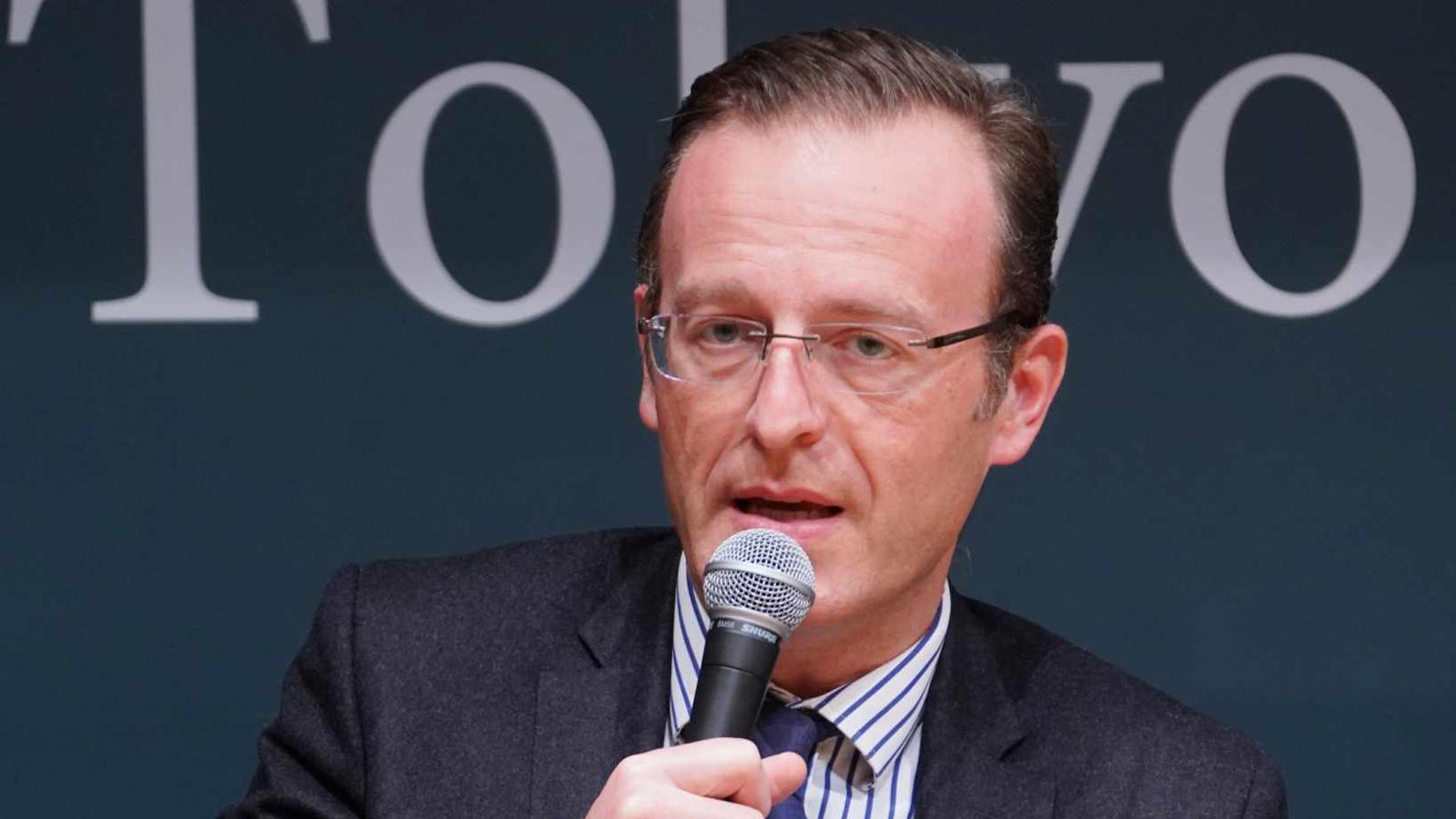
"We are in a new nuclear era," he said. "With the collapse of the USSR, we had a disconnection between a conventional military strategy and a nuclear military strategy. Because of Ukraine, there is a reconnection of these two types of strategies, which is a real game changer."
Gomart explained that Russia is not the only country posing a nuclear threat, pointing to Iran and North Korea and suggesting that their collective policies have put the West in a more defensive position. He provided an option for responding to that growing threat.
"We should seriously defend the non-proliferation policy treaty," he said. "And we should restore a culture of arms control."
Once the first five panelists were finished speaking, the other participants were invited to add to the discussion. Ettore Greco, Executive Vice President of Italy's Institute of International Affairs (IAI), responded first.
"There is the real prospect that the US will decide not to continue with its support," Greco said. "With Russia gaining ground, with the prospect of the disengagement of the US, Putin would not make real concessions. That is clear. The military support will be very instrumental in blocking the Russian invasion and avoiding a wider European conflagration. If he had been successful in reaching the western part of Ukraine, the risk of confrontation with NATO would have risen significantly. Even if we are thinking about negotiations, we cannot afford to suspend this type of support."
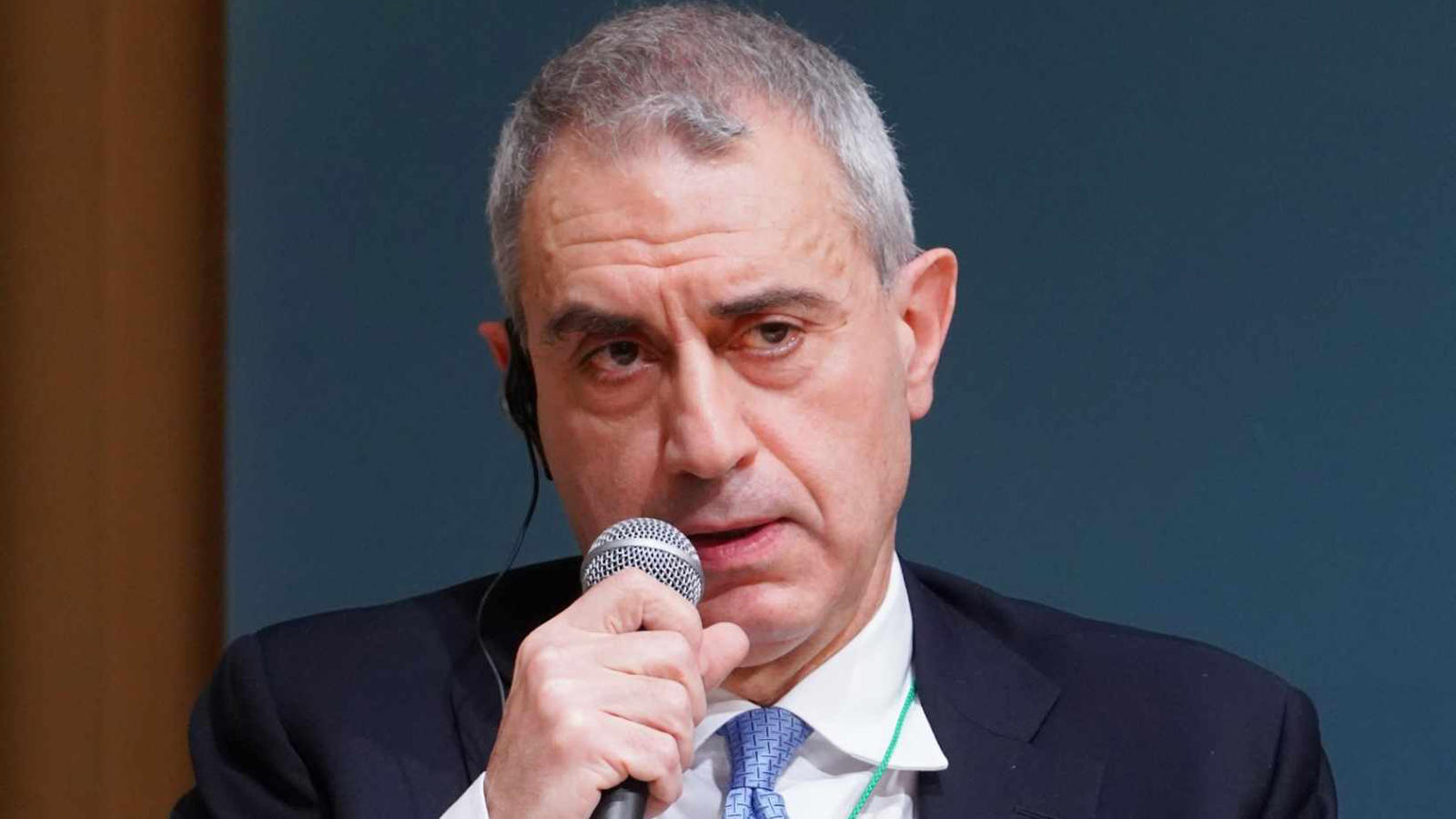
Paul Samson is President of Canada's Centre for International Governance Innovation (CIGI), and he referred back to previous commentary on the number of conflicts currently ongoing worldwide when he said, "That indicates to me that there is a systemic problem. I think the first principle question is 'why is there any legitimacy in the United Nations system for one sovereign state to invade another and that not to be declared universally off-side?' Reform of the system is required to solve this conflict."
Bronwen Maddox, Director and CEO of Chatham House in the United Kingdom, spoke about the potential entry of Ukraine into NATO.
"One of the things that Europe and NATO could do now is clarify whether they are really prepared to give membership to Ukraine," she said. "You hear conversations that are too nuanced for Ukrainians' comfort about whether those are real offers. I think they should be. Particularly NATO."
Regarding Gaza, Maddox referred to the "double standards" in responses to the situation and said that the "US' tolerance of years of Israelis moving into the West Bank is 'coming home to roost'." However, she expressed a positive view of Saudi Arabia's efforts to bring the conflict to an end, but added, "A lot of it hangs on Israel and only the US, at this point, can influence Israel, although it has chosen not to do everything it can to bring this to a pause."
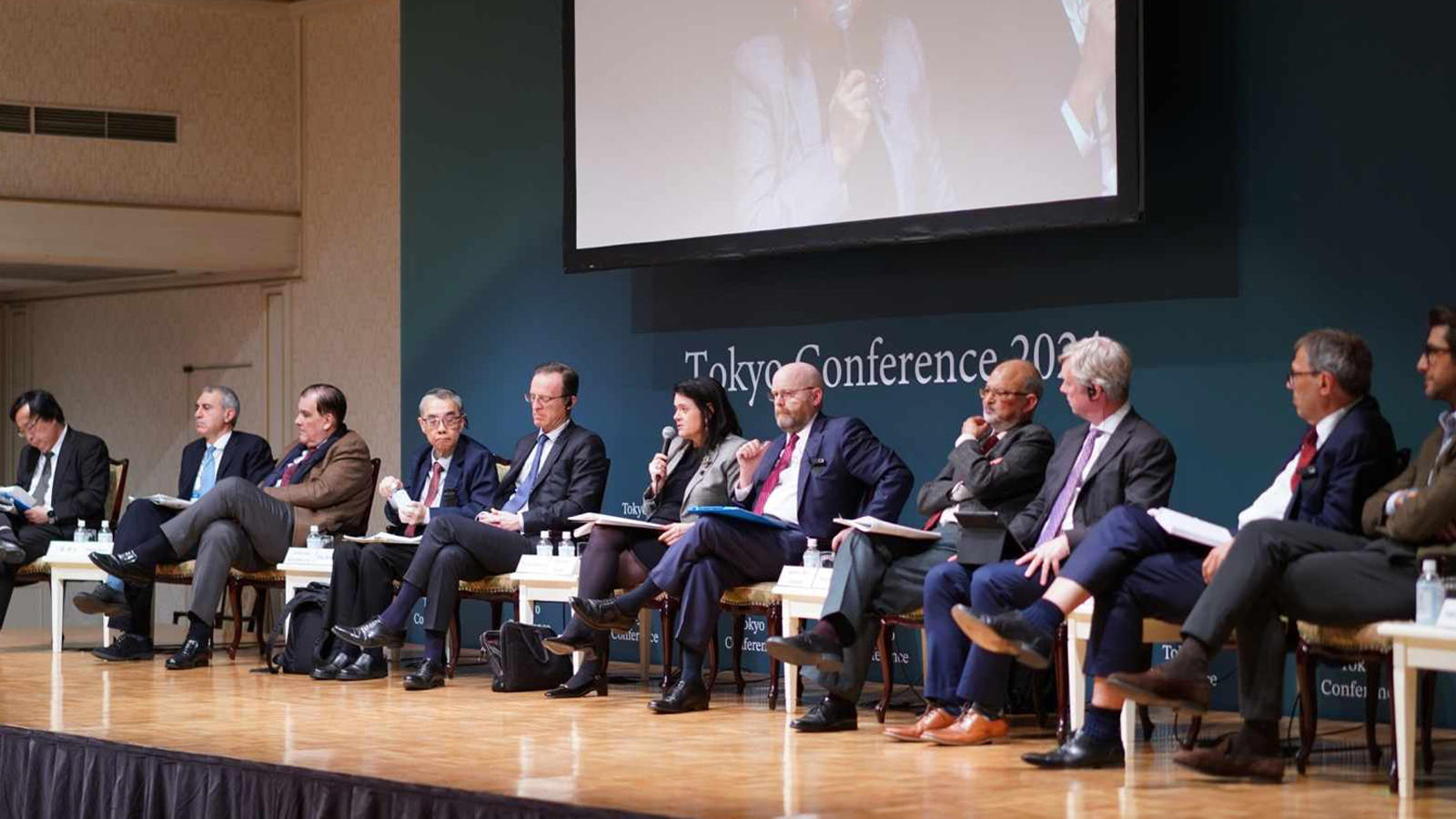
Ong Keng Yong is Executive Deputy Chairman of the S. Rajaratnam School of International Studies (RSIS) in Singapore and formerly served as Secretary-General of ASEAN. Ong provided a Southeast Asian perspective of the situation in Gaza.
"Many of us in Southeast Asia tend to look at the religious dimension. As you know, Southeast Asia has a large Muslim population, but those of us who do not have a big population are under more pressure because we are supposed to understand the dilemma facing Muslims" he said. "Overall, I think the hope is that some kind of arrangement can be executed through the cooperation of the United States of America and other bigger countries who have some influence. But we do not see how peace can be easily obtained in Ukraine or in the Gaza area."
Carlos Ivan Simonsen Leal, President of the Getulio Vargas Foundation (FGV) of Brazil, described the current situation as a "game of four players: the United States, Russia, China, and the European Union, including Great Britain. The game can't be understood fully without understanding what's going on in the South China Sea. These things are related. This is a superpower fight."
Leal also suggested that the entrance of Sweden and other countries into NATO could have unforeseen consequences.
"Strategically (Putin) may provoke NATO in different ways," he said. "You have to think of the game ? not what has passed, but what is going to happen from now on given the actual configuration of today."
Lindsay was given an opportunity to address some of the previous observations before the discussion progressed.
"It is striking that China, which has stressed during its rise its interest in promoting international cooperation, and has spoken time and time again about the importance of national sovereignty...has been noticeably absent in both conflicts. Particularly in the Ukraine conflict. We do not get a Chinese government that is defending the principle of the inviolability of national sovereignty, but instead has a strategic partnership 'without limits' with Russia," he noted. "If we are looking for ways to bring the conflict to an end, it seems that China, if it so chose, has a role to play."
Regarding the conflict between Israel and Hamas he referred to the two-state solution, which he described as having been brought back to the table.
"I think it would be ideal if we could revive it as an approach, but there is a significant obstacle," he said. "It seems to be popular with everyone but the two parties who matter the most. The Israelis and Hamas."
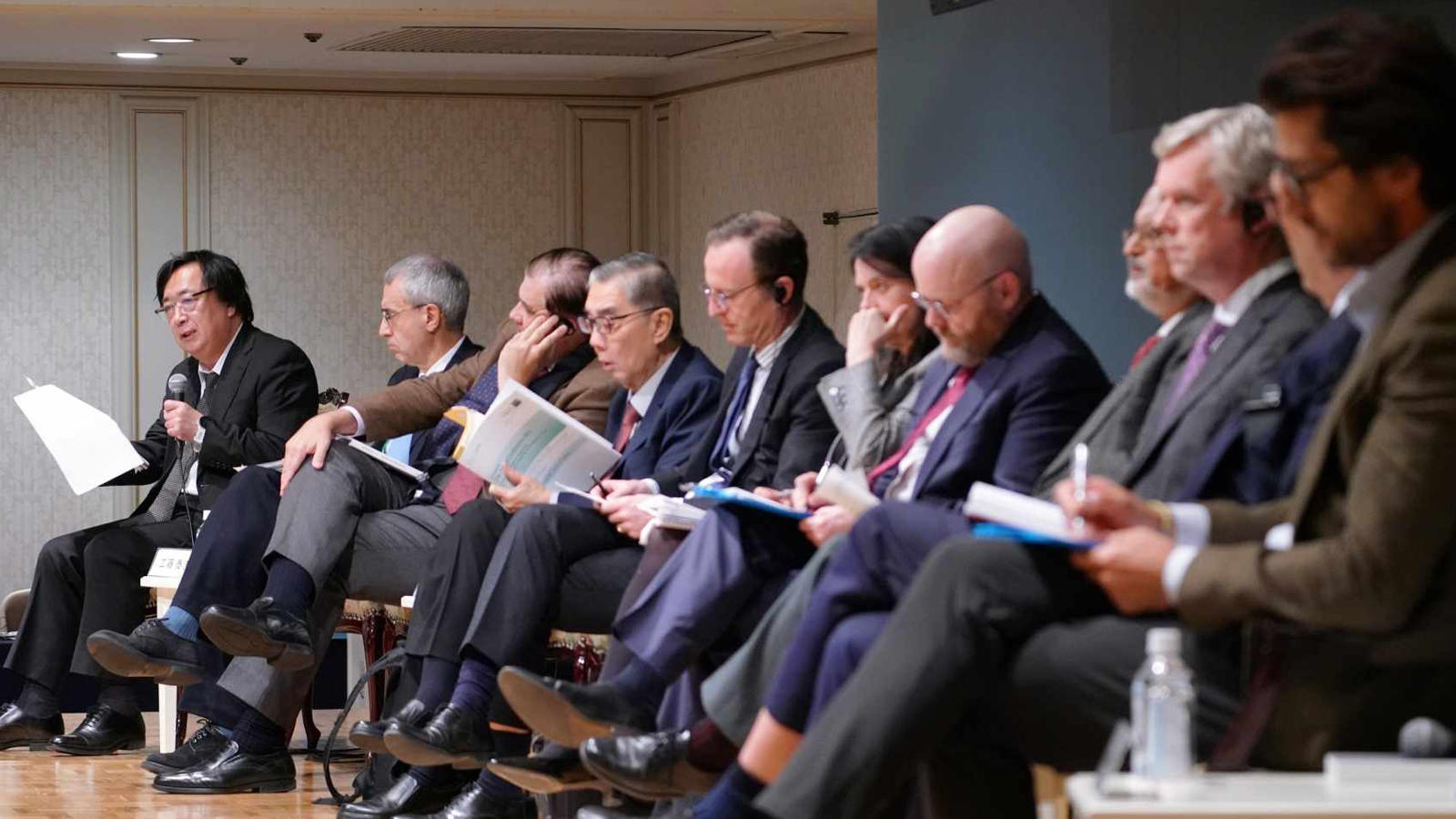
Many see difficulties in implementing a two-state solution for Israel and Palestine
Kudo directed the discussion towards the two-state solution for Israel and Palestine, asking the panelists to consider the fact that the US government is promoting it, but there may be permanent members of the Security Council opposing it.
Greco was first to respond when he said, "There are a lot of formidable obstacles to implementing a two-state solution, but it is important that this end-goal is widely shared. For the post-conflict situation (there is a) need for a transitional authority in Gaza that could help...there should be international engagement, and of course it should be accepted by Israel, and that is another big obstacle."
Kudo asked whether Israel should be in charge of governance in the region while it is being reconstructed, and if Palestine has the ability to do it itself. Pothier answered that success lies in whether the Gulf countries are willing to be involved in reconstruction, and where Iran and Hezbollah will be interested in a two-state solution before pointing to the fragmented opinions of the Israeli population as well.
"It's not really the Israeli mainstream supporting a two-state solution," he said.
Kudo then asked whether the United Nations has an institutional role to play, and Maddox responded by saying, "I think that feels a bit premature."
Encouraging China to change how it involves itself in Ukraine and Gaza
After a few more comments on this issue, Kudo asked, "Territoriality and sovereignty must be protected, but no one is able to stop those who violate these principles. How do we work together to address this?"
Leal looked back at South Korea during the Korean War.
"Sometimes you have wars that you can neither win nor lose," he said. "That was the case with Korea 70 years ago. Why is that (potentially) so for Ukraine? Suppose Ukraine wins. What would be the political result inside Russia? Is Vladimir Putin going to continue as president? Is the physical structure of Russia going to continue as a monolith, or is it going to fragment? The Soviet Union fragmented; Russia can fragment further. What happens to the limitless natural resources of Siberia? Do they go to China? Are you creating a monster bigger than anything we have known in history?"
"We have to remember that the solution proposed by George Kennan (regarding how to deal with the Soviet Union during the Cold War) was the smartest solution in probably 100 years: containment. But containment how? Containment of Russia and China simultaneously?" Leal asked. "Unfortunately, events have helped push these two nations together...what was learned in the past, and used successfully, should be used now."
Greco added, "It is our task to continue stimulating China to be constructive in various environments."
Gomart spoke about the two-state solution for Gaza and suggested that what can be done now is support of the people of Gaza, before returning to the issue of Russia and China.
"It's clear that the objective of the Kremlin is to destroy the EU," he said. "But it's different with China. China tried to encourage the EU to exist by itself, not only the single market but also the strategic ambition of the EU in its competition with the US. The problem is how do we deal, on the one side, with the entente between Russia, Iran, and North Korea, and on the other side with China, and how do we analyze the links between these two sides."
Pothier brought up the previously-mentioned "new nuclear era."
"Vladimir Putin has not fundamentally the Russian nuclear posture, but his willingness to signal the nuclear dimension of the Russian posture has been successful in closing off the conflict from direct intervention by NATO and NATO countries," Pothier said. "The problem is that there are others watching and drawing some conclusions that you can indeed, without employing nuclear weapons but by signaling that there is a possible employment, you can close off a whole conflict area to an intervention by allies and partners. I think Taiwan here is particularly relevant."
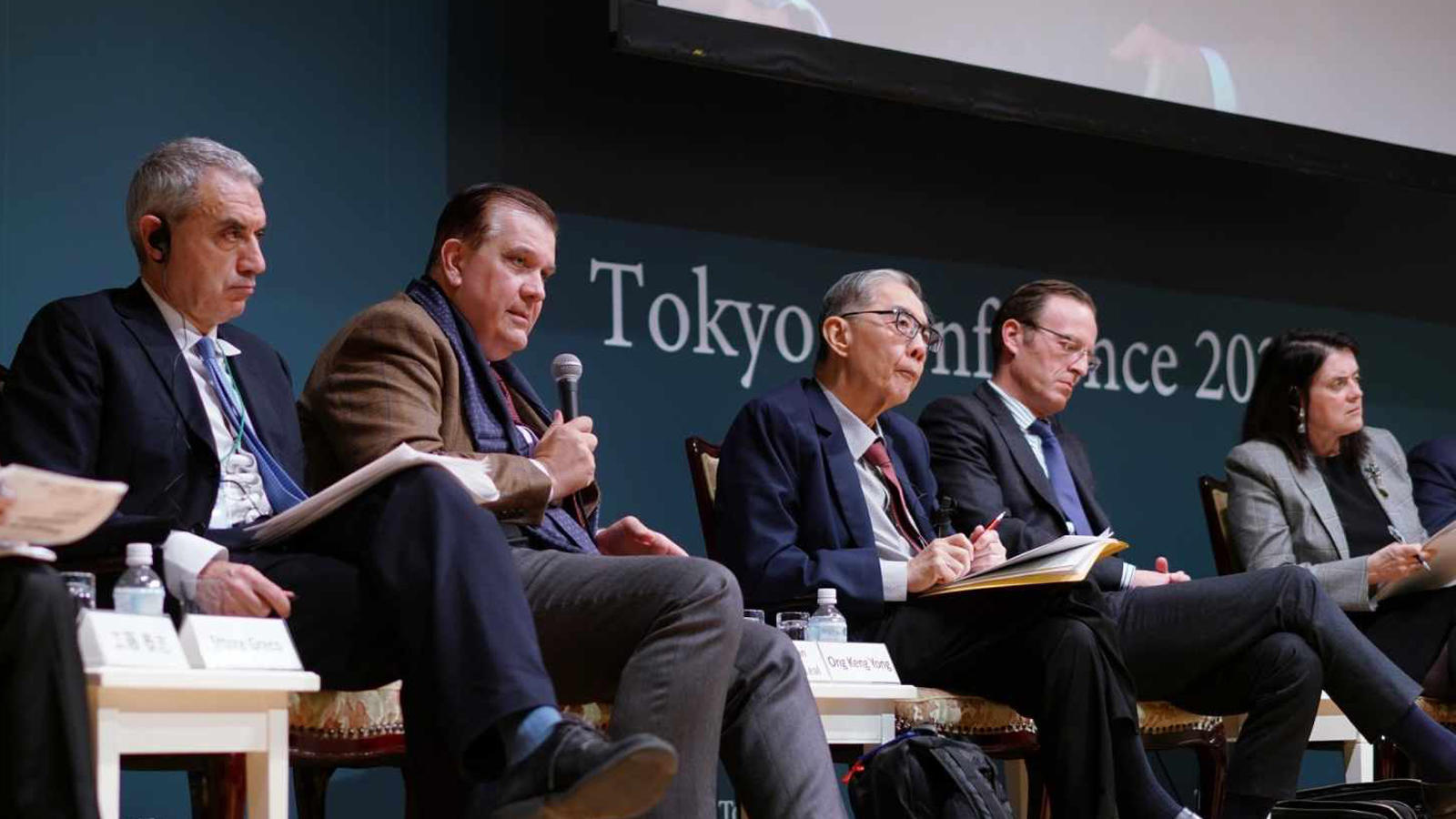
Presenting a single guideline based on international law and international human rights law rather than depending on the UNSC
Kudo once again brought up the involvement of the UN Security Council, which has been continuously criticized for its ineffectiveness, and asked Kimihiro Ishikane, who was in attendance observing the session, to share his views on the issue as the former Ambassador to Japan's Permanent Mission to the United Nations. Ishikane drew on his experience serving for a period in the presidency as a non-permanent member of the Security Council.
"It should not be the Security Council deciding what should happen in Gaza," he said. "A more multi-faceted approach should be taken. Extinguishing the flames of this conflict is almost impossible. It would be better if we could present a single guideline formulated based on international law and on international human rights law."
Maddox and Lindsay were asked by Kudo to offer some final comments.
"It seems to me the real threat of what has happened in Ukraine is that countries will conclude that they need nuclear weapons, and that threat of proliferation is one of the unfortunate lessons that countries may take from the way the Budapest Memorandum (the agreement assuring the security of Ukraine, Belarus, and Kazakhstan signed in 1994 by the US, Russia, and the UK) proved not to be worth anything in the way of protection," Maddox said.
Lindsay returned to a previous point made by Joshi about not allowing these conflicts "to fester," but expressed some pessimism about whether avoiding that is possible. He also pointed out that there are a number of unknowns to deal with, and that the situation in Ukraine "could change quite dramatically over the next year, and not in a way that favors western interest."
"There's also the question about whether the next American administration, if it is Donald Trump, will take an entirely different approach to this," Lindsay said. "There are a bunch of other wild cards...that could change the course of this conflict."
Kudo brought the first session of the Tokyo Conference 2024 Public Forum to a close, reiterating his belief in the importance of the international community working together towards achieving the goals of conflict resolution and peacebuilding, and emphasizing that while finding solutions may be a challenge, "We must continue to think about them."
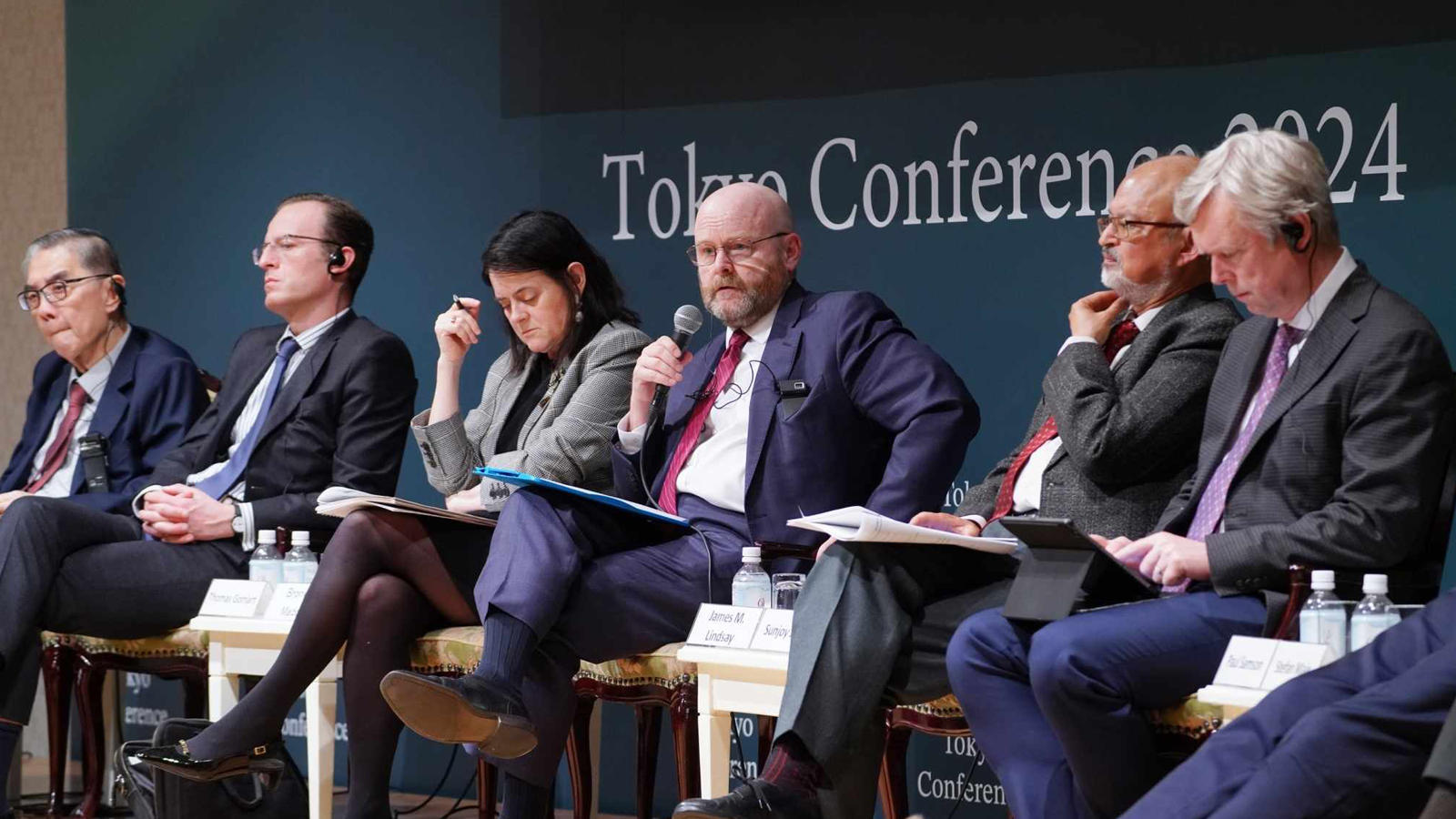
Post a comment